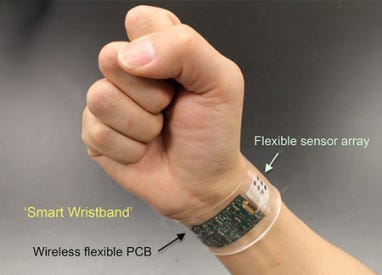Performing medical diagnostics is no sweat for this wearable device
The medical wearables market is in robust health, according to multiple industry analysts, with Research and Markets (Dublin) forecasting more than 20% annual growth in the next five years to reach approximately $14 billion by 2020. That may even be a conservative estimate, if researchers continue to find novel ways to extract meaningful health information from wearable devices.
January 29, 2016
The medical wearables market is in robust health, according to multiple industry analysts, with Research and Markets (Dublin) forecasting more than 20% annual growth in the next five years to reach approximately $14 billion by 2020. That may even be a conservative estimate, if researchers continue to find novel ways to extract meaningful health information from wearable devices. That's what Ali Javey, a professor of electrical engineering and computer science at the University of California, Berkeley, and his team have achieved with a head- or wristband that monitors the chemical make up of sweat to non-invasively assess medical conditions.
|
Image courtesy Wei Gao/UC Berkeley. |
The wearable sensor measures metabolytes and electrolytes present in human sweat to determine a range of health issues, including fatigue, dehydration and body temperature. It is reportedly the first fully integrated electronic system that can provide continuous, non-invasive monitoring of multiple biochemicals in sweat. The research is described in the Jan. 28, 2016, issue of Nature.
"Human sweat contains physiologically rich information, thus making it an attractive body fluid for non-invasive wearable sensors," said Javey in a news release published on the UC Berkeley website. "However, sweat is complex and it is necessary to measure multiple targets to extract meaningful information about your state of health. In this regard, we have developed a fully integrated system that simultaneously and selectively measures multiple sweat analytes, and wirelessly transmits the processed data to a smartphone. Our work presents a technology platform for sweat-based health monitors," said Javey.
The prototype developed by Javey and his research team packs five sensors onto a flexible, 100-μm-thick polyester film. The sensors measure the concentrations of sodium and potassium ions as well as glucose and lactate, reports Science. A flexible circuit board with 11 off-the-shelf computer chips interprets the data coming from the sensors, which is transmitted wirelessly to a laptop or cell phone.
"The integrated system allows us to use the measured skin temperature to calibrate and adjust the readings of other sensors in real time," said study co-lead author Wei Gao. "This is important because the response of glucose and lactate sensors can be greatly influenced by temperature."
Researchers put the prototype to the test, as dozens of volunteers cycled on stationary bikes or ran outdoors on tracks and trails from a few minutes to more than an hour. The device functioned as intended. "Besides being portable and noninvasive (no needles required!), the prototype monitors chemicals in real time, eliminating the time and effort usually needed to collect samples and transport them for analysis to a lab with large, expensive equipment," writes Science.
The flexibility of this technology extends well beyond the physical device, and it could be used to measure a host of other body fluids, according to the UC Berkeley news release. "While Professor Javey's wearable, non-invasive technology works well on sweating athletes, there are likely to be many other applications of the technology for measuring vital metabolite and electrolyte levels of healthy persons in daily life," said George Brooks, a UC Berkeley professor of integrative biology, who contributed to the research. "It can also be adapted to monitor other body fluids for those suffering from illness and injury."
About the Author(s)
You May Also Like





